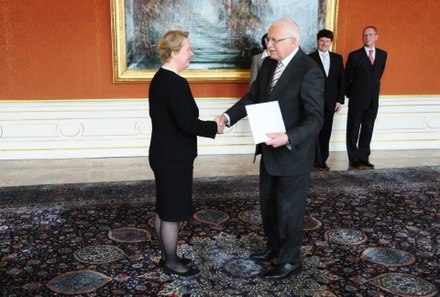Ambassador
An ambassador is an official envoy, especially a high-ranking diplomat who represents a state and is usually accredited to another sovereign state or to an international organization as the resident representative of their own government or sovereign or appointed for a special and often temporary diplomatic assignment.[1] The word is also used informally for people who are known, without national appointment, to represent certain professions, activities and fields of endeavor such as sales.
An ambassador is the ranking government representative stationed in a foreign capital or country. The host country typically allows the ambassador control of specific territory called an embassy, whose territory, staff, and vehicles are generally afforded diplomatic immunity in the host country. Under the Vienna Convention on Diplomatic Relations, an ambassador has the highest diplomatic rank. Countries may choose to maintain diplomatic relations at a lower level by appointing a chargé d'affaires in place of an ambassador.
The equivalent to an ambassador exchanged among members of the Commonwealth of Nations are known as High Commissioners. The "ambassadors" of the Holy See are known as Papal or Apostolic Nuncios.
The term is derived from Middle English ambassadour, Anglo-French ambassateur; akin to Old High German ambaht, "service". The first known usage of the term was recorded around the 14th century.[1]
The foreign government to which an ambassador is assigned must first approve the person. In some cases, the foreign government might reverse its approval by declaring the diplomat a persona non grata, i.e. an unacceptable person. This kind of declaration usually results in recalling the ambassador to their home nation. In accordance with the Congress of Vienna of 1815 and the 1961 Vienna Convention on Diplomatic Relations, the ambassador and embassy staff are granted diplomatic immunity and personal safety while living abroad.[2][3]
Due to the advent of modern technologies, today's world is a much smaller place in relative terms. With this in mind, it is considered important that the nations of the world have at least a small staff living in foreign capitals in order to aid travelers and visitors from their home nation. As an officer of the foreign service, an ambassador is expected to protect the citizens of their home country in the host country.[4][3]



.jpg/440px-Ambassador_(Persia).jpg)